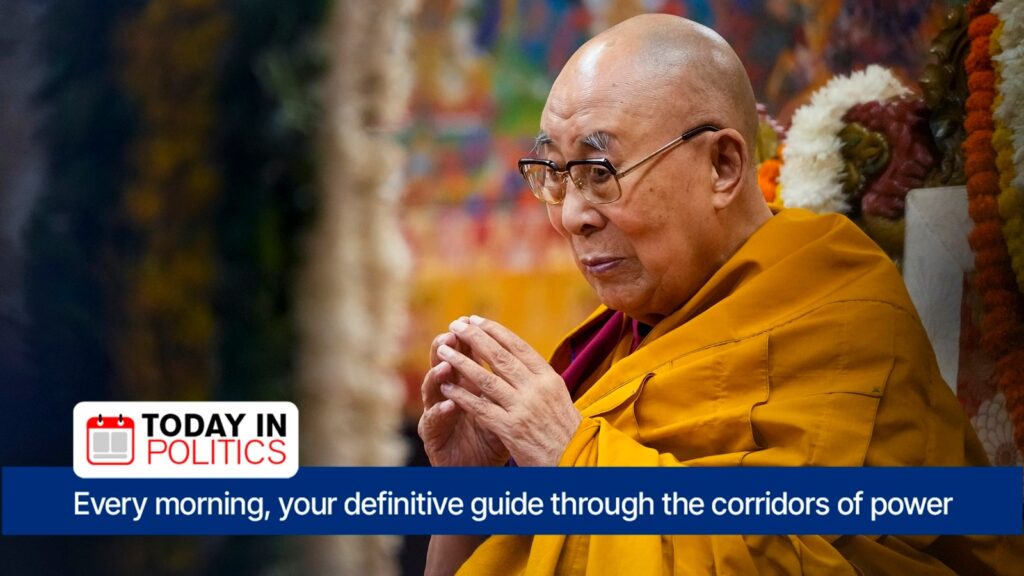On Sunday, the Dalai Lama, the spiritual leader of Tibetan Buddhism, turns 90.
Earlier last week, he had said that the continuation of the institution of the Dalai Lamas will happen under “some kind of a framework”.
The statement assumes significance because in 2011, the leader stated he would consult the Tibetan High Lamas and the Tibetan people to re-evaluate whether the institution should continue when he turns 90.
Sunday will also mark the conclusion of a Buddhist religious conference in McLeodganj, Dharamshala, where he lives. There is also anticipation around a video statement from the Dalai Lama, which could mention the process for selecting the next reincarnation of the holy leader.
The selection of the next Dalai Lama matters not just for Tibetan Buddhists but also for China, India, and the United States. Following an uprising against Chinese control of Tibet, the Dalai Lama fled to India in 1959 with 80,000 of his followers and established a government-in-exile. The Chinese government has since described him as a “wolf in monk’s clothes” and sought to extend its control over Tibetan Buddhism.
On July 4, the Ministry of External Affairs released a carefully worded statement saying the government “does not take any position or speak on matters concerning beliefs and practices of faith and religion. The Government has always upheld freedom of religion for all in India and will continue to do so.” Beijing, which views the Dalai Lama as a “separatist”, prohibits any public show of devotion towards the Tibetan spiritual leader. For China, a say in the selection process of the Dalai Lama, a deeply revered figure in Tibet, is seen as a way to exert its authority over the Tibetan people.
China has rejected the Nobel Peace laureate’s succession plan, insisting that any future heir must receive its seal of approval. Chinese Foreign Ministry spokesperson Mao Ning said that the reincarnation “must be chosen by drawing lots from a Golden Urn, and approved by the central government (of China).”
A day later, Minority Affairs Minister Kiren Rijiju — who, along with Union Minister Rajiv Ranjan Singh, is representing the Indian government at the Dalai Lama’s 90th birthday event in Dharamshala on July 6 — said the decision (on the incarnation of the Dalai Lama) would be taken by the established institution and the Dalai Lama himself, no one else.
RECOMMENDED READING
Dalai Lama turns 90: At McLeodganj, why celebrations are tinged with anxieties
Oppn in Bihar steps up Bihar attack
In the region comprising Purnia, Katihar, Kishanganj, Supaul and Araria districts, the Muslim-dominated Seemanchal ranks the lowest on almost all development indices in Bihar. Around this time of the year, its foremost concern is the weather, with the rains bringing annual floods and distress.
This time, there is another concern weighing Seemanchal down – the Election Commission’s Special Intensive Revision of electoral rolls, which requires voters to produce documents that few here own, or know how to go about procuring.
With the poor and marginalised likely to be the most affected by the EC drive, as the only official documents most of them hold are not valid for enrolment, political parties based in Seemanchal have taken the lead in slamming the poll panel.
Purnia MP Rajesh Ranjan alias Pappu Yadav, an Independent, has told people “not to cooperate with BLOs”, the Booth Level Officers conducting the revision exercise on the ground. In Katihar, the CPI (ML-Liberation) MLA from Barsoi, Mehboob Alam, has also told voters in his constituency “not to entertain BLOs” till he tells them to do so.
With both Pappu Yadav and the CPI (ML-Liberation) allies of the RJD, its national vice-president Shivanand Tiwari tells The Indian Express: “We all need to resist this tooth and nail.”
Tiwari puts Seemanchal, where Muslims form over 40% of the population in four districts (with their numbers over 70% in Kishanganj), as “central to the debate” around the EC move, which comes just ahead of the Assembly elections. The fact that Seemanchal borders West Bengal and Nepal, with Bangladesh not far away – inviting claims of illegal immigration – adds another dimension to the issue, the RJD leader adds.
Calling the EC drive part of “a sinister design to implement the RSS agenda”, Tiwari says it cannot be used to weed out illegal migrants, as “the Centre has no data or wherewithal” for it.
The 11 documents the EC wants from those who don’t figure in the 2003 electoral rolls (when the EC says it carried out its last Special Intensive Revision) are akin to seeking proof of citizenship.
Read the full ground report– https://indianexpress.com/article/political-pulse/race-against-time-in-seemanchal-what-can-we-do-if-our-names-are-cut-out-what-will-we-do-10108639/
Fadnavis podcast
Maharashtra Chief Minister Devendra Fadnavis has taken the podcast route. On Sunday, he is set to announce the launch of `MaharashtraDharma’.
“Starting something new…’MaharashtraDharma’, a new podcast series…And what could be a more sacred day than Ashadhi Ekadashi to begin something new?” he wrote on X.
The first episode of the podcast will be broadcast or shared at 11am on July 6 on all his social media platforms, the chief minister said.
The annual pilgrimage to the Vitthal temple at Pandharpur, undertaken by lakhs of devotees across the state, culminates on Ashadhi Ekadashi, an auspicious day as per Hindu calendar.
— with PTI inputs

